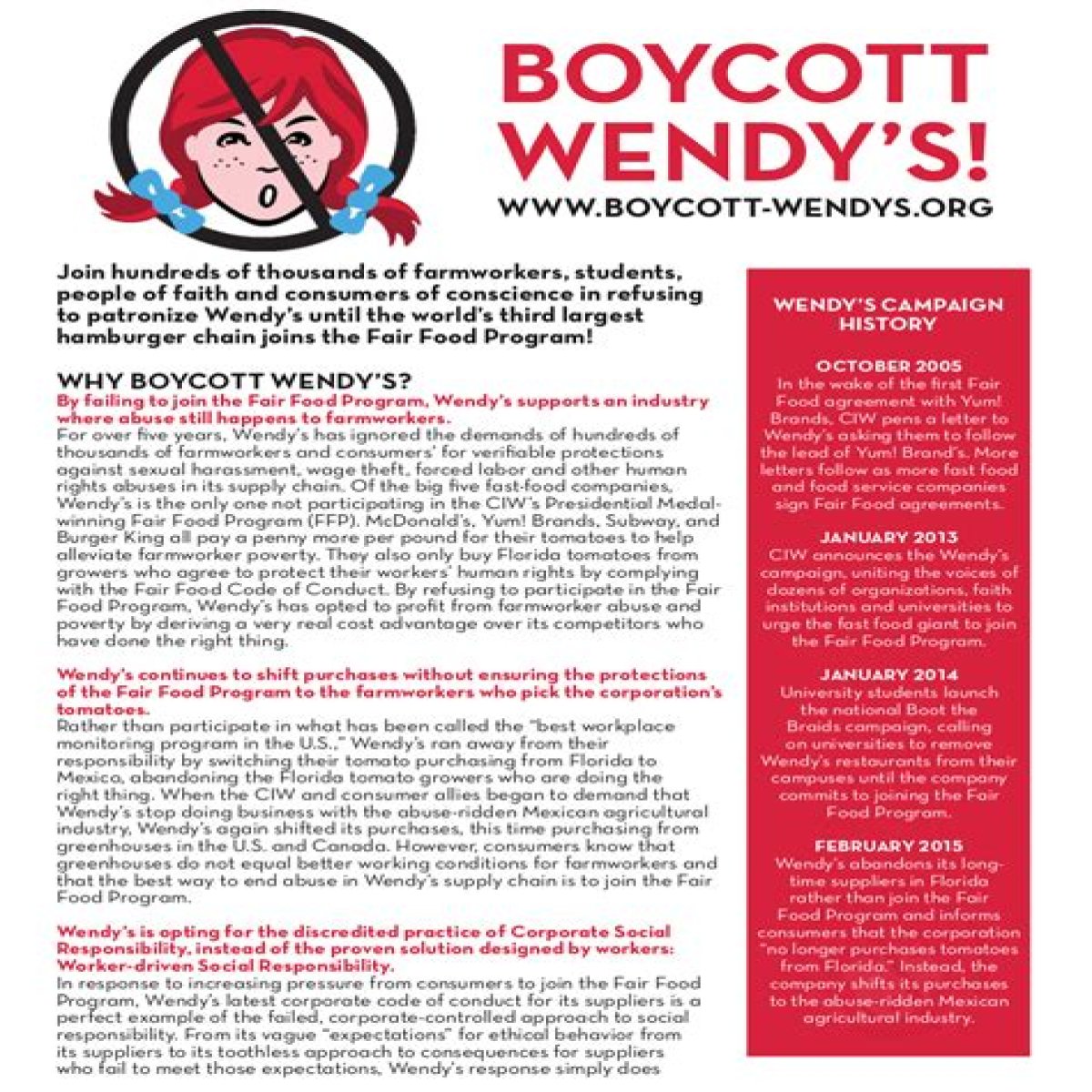The topic of Wendy's boycott of Israel has sparked significant interest and debate among consumers and activists alike. This movement, rooted in the broader Boycott, Divestment, Sanctions (BDS) campaign, calls for companies to reconsider their relationships with Israel due to its policies towards Palestinians. Understanding the motivations behind this boycott and its potential impact can help consumers make informed choices about where to spend their money.
In this article, we will explore the origins and goals of the Wendy's boycott, its connection to the BDS movement, and the reactions it has elicited from various stakeholders. By examining these facets, we aim to provide a comprehensive overview of the issue, ensuring that readers are equipped with the knowledge needed to engage in meaningful discussions about corporate responsibility and ethical consumerism.
As the situation evolves, it's crucial to stay updated on the developments surrounding the Wendy's boycott and similar movements. In doing so, we can better understand the interplay between business practices, social justice, and consumer rights.
Table of Contents
What is the BDS Movement?
The Boycott, Divestment, Sanctions (BDS) movement was launched in 2005 by Palestinian civil society organizations to advocate for Palestinian rights and to pressure Israel to comply with international law. The movement calls for:
- Ending the Israeli occupation of Palestinian land
- Recognizing the rights of Arab-Palestinian citizens of Israel
- Allowing Palestinian refugees the right to return to their homes
BDS aims to use nonviolent means to bring about change and has gained significant traction globally, with various movements advocating for boycotts against companies that support Israeli policies or operations.
Overview of the Wendy's Boycott
The Wendy's boycott is part of the larger BDS movement, focusing specifically on the fast-food chain's alleged complicity in Israeli policies. Activists argue that Wendy's supports companies that operate in Israeli settlements, which are deemed illegal under international law.
In 2016, the campaign gained momentum after Wendy's was linked to a supplier that allegedly sourced produce from Israel. This connection prompted activists to call for a boycott of the chain to protest its business relationships.
Key Events in the Boycott
- 2016: Initial calls for a boycott begin.
- 2017: Social media campaigns raise awareness.
- 2019: Protests outside Wendy's locations intensify.
- 2021: The campaign continues to gain traction among activists.
Reasons for the Boycott
Several reasons underpin the Wendy's boycott, including:
- Support for Israeli Settlements: Activists argue that Wendy's indirectly supports illegal settlements by sourcing ingredients from companies linked to these areas.
- Corporate Responsibility: Many consumers believe that companies should adhere to ethical practices and consider the social implications of their business relationships.
- Advocacy for Human Rights: The boycott is positioned as a human rights issue, advocating for the rights of Palestinians affected by Israeli policies.
Impact of the Boycott on Wendy's
The Wendy's boycott has had various impacts on the company, including:
- Public Relations Challenges: The boycott has forced Wendy's to address concerns raised by activists, potentially damaging its brand image.
- Sales Impact: While it is challenging to quantify the exact impact on sales, boycotts can lead to decreased patronage from socially conscious consumers.
- Increased Scrutiny: The boycott has led to increased scrutiny of Wendy's supply chain and corporate practices.
Responses from Wendy's
Wendy's has responded to the boycott in several ways:
- Public statements emphasizing their commitment to ethical sourcing.
- Engagement with community leaders to address concerns.
- Potential reevaluation of supplier relationships in response to consumer feedback.
The Role of Consumers
Consumers play a critical role in the success of the Wendy's boycott. Their choices can influence corporate behavior and policies. Key factors include:
- Awareness: Educating themselves about the issues at stake.
- Advocacy: Joining in protests or sharing information on social media platforms.
- Consumer Choices: Opting for alternatives to Wendy's that align with their values.
Future of the Boycott
The future of the Wendy's boycott remains uncertain. Several factors will influence its trajectory:
- Consumer Engagement: Continued interest and activism from consumers will be crucial.
- Corporate Response: Wendy's actions in response to the boycott will impact its effectiveness.
- Global Context: The broader geopolitical landscape regarding Israel and Palestine may also play a role.
Conclusion
In summary, the Wendy's boycott is a significant aspect of the BDS movement, aimed at raising awareness about corporate complicity in Israeli policies. Understanding the reasons behind the boycott and the implications for both consumers and corporations is essential. We encourage readers to engage with this issue, consider their consumer choices, and participate in discussions regarding corporate responsibility and human rights.
Feel free to leave your comments below, share this article with others, or explore more on our site to stay informed about related topics.
Thank you for reading, and we hope to see you back here for more insightful content!
Susan Sullivan: A Journey Through The Life And Career Of The Acclaimed ActressNina Aouilk Parents Now: Exploring The Life And Background Of A Rising StarKaty Louise Saunders: Discovering Her Daughter's Name
